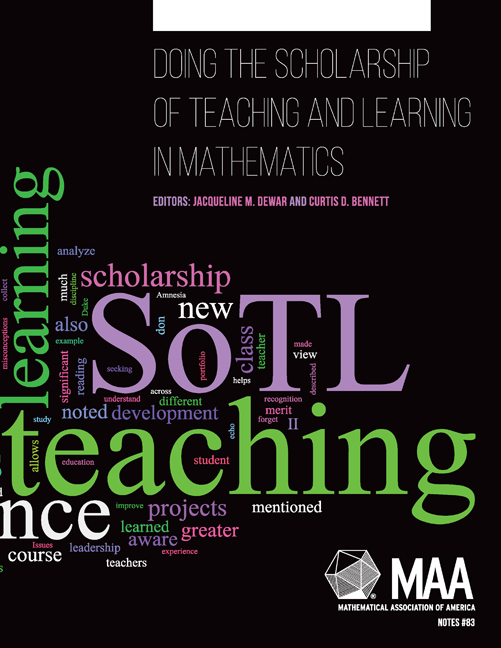Book contents
- Frontmatter
- Contents
- Foreword
- Preface
- Part I Getting Started in SoTL as a Mathematician
- Part II Illustrations of SoTL Work in Mathematics
- Theme 1: Experiments with Approaches to Teaching
- 5 Assessing the Effectiveness of Classroom Visual Cues
- 6 (Re)discovering SoTL Through a Fundamental Challenge: Helping Students Transition to College Calculus
- 7 A Quantitative and Qualitative Comparison of Homework Structures in a Multivariable Calculus Class
- 8 Playing Games to Teach Mathematics
- 9 Investigating How Students' Linking Historical Events to Developments in Mathematics Changed Engagement in a History of Mathematics Course
- Theme 2: Crafting Learning Experiences around Real-World Data or Civic Engagement
- Theme 3: Using Assigned Reading Questions to Explore Student Understanding
- Theme 4: Exploring Student Understanding of the Nature of Mathematics
- Theme 5: Tackling Large Questions
- Epilogue
- Index
6 - (Re)discovering SoTL Through a Fundamental Challenge: Helping Students Transition to College Calculus
from Theme 1: - Experiments with Approaches to Teaching
- Frontmatter
- Contents
- Foreword
- Preface
- Part I Getting Started in SoTL as a Mathematician
- Part II Illustrations of SoTL Work in Mathematics
- Theme 1: Experiments with Approaches to Teaching
- 5 Assessing the Effectiveness of Classroom Visual Cues
- 6 (Re)discovering SoTL Through a Fundamental Challenge: Helping Students Transition to College Calculus
- 7 A Quantitative and Qualitative Comparison of Homework Structures in a Multivariable Calculus Class
- 8 Playing Games to Teach Mathematics
- 9 Investigating How Students' Linking Historical Events to Developments in Mathematics Changed Engagement in a History of Mathematics Course
- Theme 2: Crafting Learning Experiences around Real-World Data or Civic Engagement
- Theme 3: Using Assigned Reading Questions to Explore Student Understanding
- Theme 4: Exploring Student Understanding of the Nature of Mathematics
- Theme 5: Tackling Large Questions
- Epilogue
- Index
Summary
Editors' Commentary
In this chapter Rann Bar-On, Jack Bookman, Benjamin Cooke, Donna Hall, and Sarah Schott describe how one faculty member's attempt to improve student success in a special freshmen calculus sequence for underprepared students evolved into scholarship of teaching and learning. Key to this progression was collaboration with academic support professionals and non-tenure track faculty. Thoughtful discussions, a few trial interventions, and examining the research literature enabled the group to move from reflection and experimentation to scholarly teaching and then to the scholarship of teaching and learning. After several years of collaborative effort, a grant application to further develop, study, and share the results of this work was submitted to the NSF.
Introduction
Through the efforts of the Carnegie Foundation and others, many faculty are introduced to SoTL through conferences, workshops at their institution, colleagues, or journal articles devoted to SoTL (Hutchings, 2010). As discussed in this volume, these activities have struck a chord with, and given voice to, the scholarly and intellectual interests of many faculty in higher education. The growth of SoTL has provided validation and motivation for faculty to develop SoTL projects. In this chapter, we describe a different introduction to SoTL, one that is more unintentional and less self-conscious. We will discuss how a small group of faculty faced with an instructional problem gradually adopted an increasingly scholarly approach to addressing it. Instead of scholars creating solutions to problems, in this case a problem created scholars.
We were all exposed to SoTL work early in our careers. We mostly set it aside as we pursued our teaching. We rediscovered it when the need arose, and we wanted to stand on the shoulders of those who had attempted to address the problems we encountered. We believe that our experience can be instructive for those who are new to SoTL and for those who have had some involvement with it.
- Type
- Chapter
- Information
- Publisher: Mathematical Association of AmericaPrint publication year: 2014



